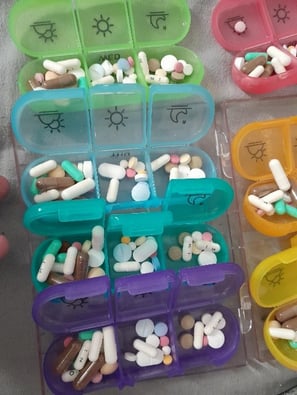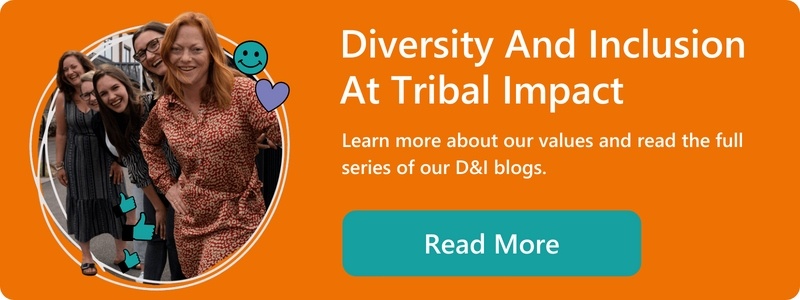We took a financial hit for everyone’s mental health – Lucy Goodey
Disabilities can affect people in so many different ways. You might see a person on crutches or in a wheelchair and know, definitively, that they have a physical ailment. Likewise, certain behaviours or traits, or a carer present, might signify a mental health condition or learning disability. However, there are disabilities that present themselves in a far more subtle manner. Due to this, a level of discrimination can occur, often unintentionally. When you add that to the lack of resources that are visible, it can sometimes be difficult for people to see you beyond your disabilities.
Root causes
Hidden disabilities can be genetic, and some may also be temporary. For me, neither are the case. In late 2020, I was pregnant with my third child. After resolving some issues that threatened premature labour, I figured I would continue as normal until my due date.
Approximately ten days after this, I noticed pins and needles in my legs. Initially, the doctors wrote this off as pregnancy anxiety. However, over the next few days, I noticed this feeling moving upwards. In addition to this, I felt like I was drunk which, considering I was pregnant and off alcohol, was impossible.
Having visited the hospital to check if it was a reaction to my previous anaesthetic, the next few hours promptly vanished. I eventually woke up after being taken by blue lights to Southampton Neuro ITU, where I was diagnosed with Transverse Myelitis, or lesions on the spinal cord.
I was put on a high dose of steroids and had a permanent catheter inserted via my stomach, as I had lost all function in both my bladder and bowel. We were also warned that this could severely impact my pregnancy. While struggling to manage the pain and numbness in my body, I also had the fear of losing my baby. Thankfully, Florence was born in February 2021 with no issues and, today, is a happy, healthy toddler.
This condition presents fairly similarly to Multiple Sclerosis, and could very well advance to that at some point. Yet, at least for the time being, my lesions remain solely on the spinal cord, not within the brain.
Next Steps
Several things occurred at this point. Firstly, my husband Darren took three months off of his work with the RAF to look after me. He returned on reduced hours for approximately six months. We needed to think about our finances as my maternity leave was going to end, as well as my sick pay.
I’ve recently had a first stage neuromodulation device, similar to a pacemaker, fitted to my bladder, with another operation imminent to permanently attach it. This should improve my quality of life significantly.
I had to give up my beloved nursing career as I wasn’t able to work safely. In fact, for the first few months, I was completely housebound. Looking after children while in pain wasn’t a pleasant experience. We managed to get an adapted car that gave me some freedom back. I’ve also had a significant amount of therapy and mindset coaching due to the trauma of both the initial events and recovery.
Parenting
Being a parent can be difficult at the best of times. Yet, when you have a disability, it can be so much harder. We can’t go to parks because it’s too difficult to look after the younger two on my own.
Even day trips need to be planned in advance as, with my illness, I also suffer from chronic fatigue. This means that a few hours out with the children for family days can require several days of recovery afterwards.
It’s impacted my eldest daughter the most as she remembers the days of spending time out in the country or with horses, and now she’s mostly stuck indoors with her younger siblings. Her strength through this has been incredible, and she was able to access Young Carers, as well as some brilliant support from the military.
When it comes to my operations, or needing support, I’ve had to learn to rely on my Mum, in-laws, and some wonderful close friends for help looking after my children. I don’t know what I’d have done without them, especially when my husband is away with the RAF.
Discrimination
Having a hidden disability means that, at first glance, people may look at me and see a perfectly normal 32-year-old woman out with her family. This cannot be further from the truth. I’m on 36 tablets a day just to have some semblance of a life without pain.

We’ve been subject to looks and comments when out, especially about the car we have or use of disabled parking bays. People seem to think that they have a right to comment on whether or not a person looks disabled, without considering that the issue may not be on the surface.
Likewise, public transport can also have its own issues. There’s been many times when I’ve been on the train and people stare at my catheter bag. I did try wearing a sunflower lanyard, but found that this either wasn’t seen or was ignored.
Due to the issues with my bladder, there have been occasions where I have had accidents, or my catheter has broken. I don’t feel this, meaning I’m often unaware until someone points it out, normally with nudging, whispering between people, or staring rather than discreetly telling me. This can be incredibly damaging to my self-esteem and cause a great amount of anxiety.
One of the worst instances of discrimination that I’ve faced was when out with the children. When I’m tired my speech often becomes slurred and my foot might drag. I have previously been accused of being drunk around my children. In this instance, it was my eldest daughter, at 9 years old, who corrected the person.
When you factor in that 14.6 million people have a disability within the UK, it’s easy to see just how many of those might not be obvious to spot. Of this, 53% of people are in work. Having a disability doesn’t mean a person doesn’t want to work, but that certain adjustments might be required for them to do so. I certainly want to work as I’m very driven and career focused.
.png?width=660&name=Blog%20Template%202021(22).png) Assistance
Assistance
There are a number of benefits and support available for those with disabilities, but they simply aren’t accessible enough.
I managed to get Personal Independence Payment, or PIP, to help with the costs associated with my condition. This allowed me to get the car through the Motability scheme, access a shower chair, and even hire a cleaner to help out around the home.
The biggest issue we have is around childcare. I could stay home, but that wouldn’t be good for my children or me. I want to work as, even before this, I have always been incredibly career-focused. Likewise, my children can get out, build their social skills, and have fun. The problem here is that the childcare costs are often more expensive than my wages. This means we are effectively paying for me to be able to work despite me having a really healthy wage- it’s bizarre. This is a common problem lots of parents across the UK face. Pregnant then screwed are really helping to challenge this.
We can’t get Universal Credit to help. Therefore, our options are to either continue paying out for childcare, or I stop working entirely and we’d be better off financially, even despite using tax-free childcare.
There isn’t enough assistance in terms of the disability either. While I have people around me to help, they can’t be there 24/7. There has been times where I’ve rung social services myself to try and gain additional support. I was previously advised to hire a nanny for my children. However, we, like many families, are not in a position to be able to afford this.
Working at Tribal
When I was diagnosed I never thought I’d get to work again. Gaining the job offer from Tribal, and the ability to work remotely and flexibly, felt too good to be true. Luckily for me, it wasn’t. I’m now able to work at hours that suit me.
Sarah Goodall is incredibly understanding about my needs. If I need to rest and make up time later, I can. The rest of the team are also fully supportive of my needs.
With another operation on the horizon, I offered to take annual leave to cover this period. This was shot down, as Tribal don’t feel that it’s right for me to use my holiday time for a medical necessity.
We also have retreats in September, which I help to organise. Ideas have been thrown around for activities. Should one be raised which isn’t accessible for everyone, it’s immediately thrown out of the consideration pile. If it isn’t inclusive, that idea isn’t for Tribal, no matter how fantastic it may be.
I spent a lot of time trying to work on my mental health after my diagnosis, and this is something that Tribal champions: the wellness of all involved. It’s great to work somewhere where you’re seen as an individual, rather than a number.
Concluding remarks
More businesses may need to think about the needs of their employees. This can help to build and strengthen the relationship with people, and even motivate them to do more.
When out and about, you may want to think before you cast judgement on a person. Just because they may look healthy, that doesn’t mean there are. There are a number of illnesses, both physical and mental, which may be classed as a disability. These aren’t always obviously visible.
.png?width=674&name=Blog%20Template%202021(23).png) Often our disabilities may be hidden, but that doesn’t mean we need to stick to the shadows. There’s so much more to me than that one aspect. If people took the time to respect my additional needs, and that of those around them, they may find there’s a whole person underneath that diagnosis. Luckily for me, I get the chance to show this, due to overcoming my anxiety and promoting awareness. It’s crucial to remember that others don’t always feel confident doing so – let’s change this!
Often our disabilities may be hidden, but that doesn’t mean we need to stick to the shadows. There’s so much more to me than that one aspect. If people took the time to respect my additional needs, and that of those around them, they may find there’s a whole person underneath that diagnosis. Luckily for me, I get the chance to show this, due to overcoming my anxiety and promoting awareness. It’s crucial to remember that others don’t always feel confident doing so – let’s change this!

